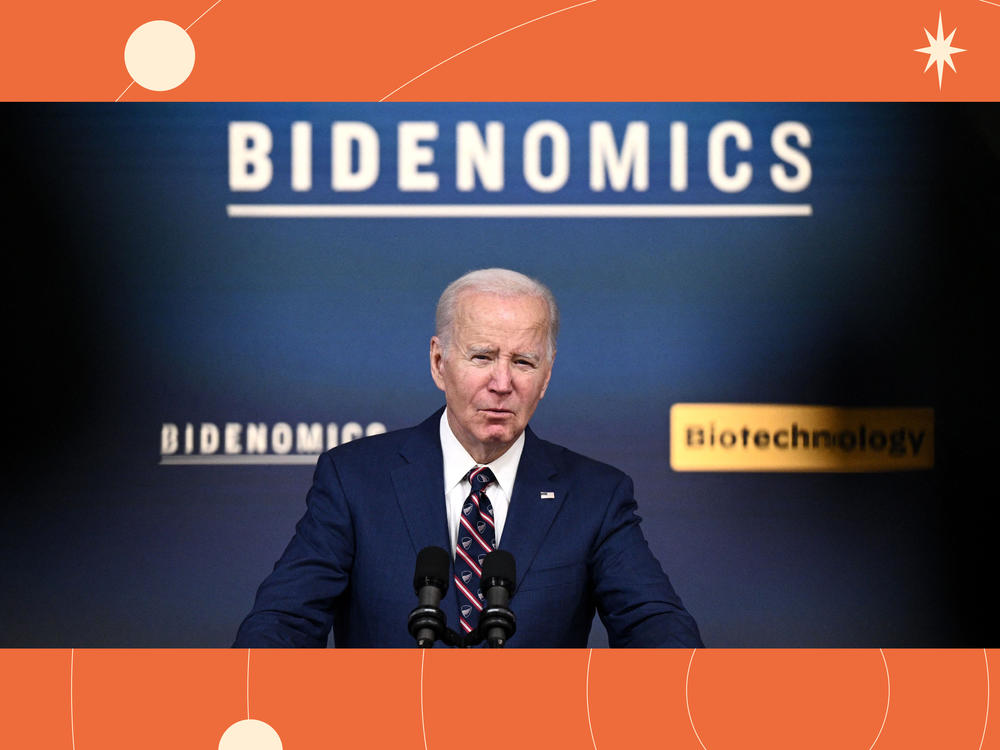Section Branding
Header Content
A controversial idea at the heart of Bidenomics
Primary Content
Réka Juhász is a professor of economics at the University of British Columbia, and she studies what's known as industrial policy.
That's the general term for whenever the government tries to promote specific sectors of the economy. Industrial policy used to be pretty popular — countries thought they could supercharge economic growth by giving money to certain kinds of businesses, or by putting up trade barriers to protect certain industries.
But since the 1980s, industrial policy has largely fallen out of favor among policymakers. Among economists, it's been called a "taboo" subject, and "one of the most toxic phrases" in economics. The mainstream view has become that industrial policy is inefficient, even harmful — that governments shouldn't try to mess with what the economy produces, because that will just waste money or prop up bad businesses.
But in the past several years, countries have started to embrace industrial policy in big and public ways. Most notably: the United States. Right now, under President Biden, the U.S. is set to spend hundreds of billions of dollars on industrial policy, to fund things like microchip manufacturing and clean energy investments. It is one of the most ambitious tests of industrial policy in U.S. history. And the billion dollar question is ... will it work?
On today's show, Réka takes us on a fun, nerdy journey to explain the theory behind industrial policy, why it's so controversial, and where President Biden's huge experiment might be headed.
Interview Highlights
Can you just tell us, what is the definition of industrial policy?
So the definition of industrial policy that I like to use is that it is the government trying to change the composition of the economy in the service of some long run goal. So historically, this has been the government trying to kickstart industrialization. A more contemporary example would be trying to move the economy from being a fossil fuel based economy to a renewables economy, but it is very much trying to change what is produced domestically.
It seems like there are real market failures that the Biden administration is trying to target with the market not investing enough in green energy, but there are critics who say, "They're just propping up industries that are politically important. They're doing things that sound good, like manufacturing, even though, who knows if manufacturing really is the future of jobs in America."
I think those are reasonable concerns and concerns that I worry about. There is some guidance I think that the literature yields in terms of how to manage the challenges to industrial policy. In terms of informational challenges, one thing that we see across the board in cases of successful industrial policy are deep investments in bureaucratic capacity, in having a high quality bureaucracy that is technocratic. I know that sounds funny, but if you look at the Department of Energy Loan Programs Office that is distributing a lot of the Inflation Reduction Act money, that is exactly what we see happening. They have scaled up their personnel massively because they are looking at proposals for green technology. They are thinking about, who should we be giving loans to? That needs people who actually understand the technology, who actually understand the science of this stuff.
You studied France at the time of Napoleon, back when Napoleon was trying to take over the world. And you found actually a really great natural experiment hiding in all of this war stuff that was going on.
That's right. So the Industrial Revolution has started in Britain. They figured out this amazing new technology to produce cotton yarn very cheaply. And so they have this head start in this industry, and France is sort of trying to keep up. And so the Napoleonic blockade enters in this moment, and where sort of the entry point for this paper comes in is that the blockade isn't successful: It's partially successful. So what I found in this paper is that the parts of France that became more protected from trade, they thrived in the long run. And even after the blockade ended, the less well protected parts of France never managed to get into the industry in the same way. Indeed, it seems like there was some market failure in France that prevented firms from being able to enter the industry. And this temporary event was enough to sort of give certain producers in certain parts of France, the ability to overcome that externality and become competitive in the long run.
I think the message from your paper is that these market failures are real, and industrial policy can, in some circumstances, fix them and make things better. But also like, is it replicable? Could we do it again?
That's the challenge I think the paper leaves us with. So this really makes me worry that we should spend a lot more time figuring out how to do industrial policy well, because the problem is very real.
This episode was produced by Willa Rubin and edited by Sally Helm. It was engineered by Valentina Rodríguez Sánchez with help from Maggie Luthar. Fact-checking by Sierra Juarez. Our executive producer is Alex Goldmark.
Help support Planet Money and get bonus episodes by subscribing to Planet Money+ in Apple Podcasts or at plus.npr.org/planetmoney.
Always free at these links: Apple Podcasts, Spotify, Google Podcasts, the NPR app or anywhere you get podcasts.
Find more Planet Money: Facebook / Instagram / TikTok / Our weekly Newsletter.
Music: Universal Music Production, "Don't Cross The Line," "Savanna Stroll," "A Lesson Learnt"


